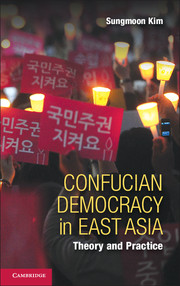Book contents
- Frontmatter
- Dedication
- Contents
- Acknowledgments
- Introduction
- Part I Beyond Thick Confucian Communitarianism and Meritocratic Elitism
- Part II Confucian Democracy in Theory – A Pluralist Reconstruction
- 4 Value Pluralism and Confucian Democratic Civil Society
- 5 Confucian Familialism and Public Reasoning
- 6 In Defense of Confucian Democratic Welfarism
- 7 Rethinking Political Meritocracy: Selection Plus Two
- Part III Confucian Democracy in Practice – The Korean Case
- Bibliography
- Index
- References
7 - Rethinking Political Meritocracy: Selection Plus Two
Published online by Cambridge University Press: 05 June 2014
- Frontmatter
- Dedication
- Contents
- Acknowledgments
- Introduction
- Part I Beyond Thick Confucian Communitarianism and Meritocratic Elitism
- Part II Confucian Democracy in Theory – A Pluralist Reconstruction
- 4 Value Pluralism and Confucian Democratic Civil Society
- 5 Confucian Familialism and Public Reasoning
- 6 In Defense of Confucian Democratic Welfarism
- 7 Rethinking Political Meritocracy: Selection Plus Two
- Part III Confucian Democracy in Practice – The Korean Case
- Bibliography
- Index
- References
Summary
As we have seen in Chapter 3, an increasing number of scholars who study East Asia have recently begun to argue that political meritocracy understood as rule by the wise and virtuous few is not only suitable for East Asian societies where there remains a strong Confucian tradition of respect for meritocratically chosen political elites, but more fundamentally offers a viable alternative to Western liberal democracy, which is often troubled by a variety of social problems that in their view germinate from liberalism’s rights-based individualism. Though these scholars disagree on how to implement political meritocracy, they concur on two points: the shortcomings of liberal representative democracy and the complexity of contemporary public affairs. First, advocates of political meritocracy argue that the policy of “one person, one vote (OPOV),” the political manifestation of rights-based individualism, ferments political irresponsibility and ultimately erodes the common good because of the unavoidable pressure on politicians, who are predominantly concerned with reelection, pandering to myopic popular opinion. Moreover, they assert that representative democracy, as long as it is OPOV based, is largely incapable of representing the interests of future generations and of the people living outside the national boundary. The second argument is independent of the ills or limitations of liberal representative democracy. Given the sheer complexity of public affairs, it is claimed, “a substantial amount of decision-making power must be placed in the hands of an intellectually agile elite, almost as a functional requirement of modern political societies.... [Hence] a pressing need for ‘brains’ in government.”
No doubt, liberal representative democracy is far from perfect, both as a political ideal and as a social practice. Furthermore, from a practical standpoint, it may not be so prudential to transplant any particular mode of Western-style democracy (note: there are multiple modes of Western liberal democracies) in East Asian soil that is still deeply soaked in communitarian, characteristically Confucian, social mores and habits.
- Type
- Chapter
- Information
- Confucian Democracy in East AsiaTheory and Practice, pp. 179 - 202Publisher: Cambridge University PressPrint publication year: 2014



